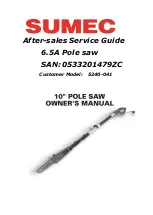
3
Original instructions
EN
II - Technical specifications
Model:
TKN 65
▪
Power input
1400 W
▪
No load speed
5000 min
-1
▪
Blade diameter
210 mm
▪
Blade bore
30 mm
▪
Blade teeth
24 TCT
▪
Maximum blade kerf
2.8 mm
▪
Maximum blade thickness
1.6 mm
▪
Maximum cutting capacity (Width x Height)
- Straight cut
0° x 0°
300 x 65 mm
- Mitre cut
45° x 0°
210 x 65 mm
- Bevel cut
0° x 45° (left)
300 x 35 mm
- Compound mitre cut
45° x 45° (left)
210 x 35 mm
▪
Maximum blade thickness (straight cut)
65 mm
▪
Minimal workpiece size
100 x 5 x 5 mm
▪
Weight (EPTA procedure 01/2003)
11.6 kg
▪
Protection class (EN 61029-1)
/ II
NOISE AND VIBRATION INFORMATION
(
Measured values determined according to EN 61029.)
▪
Noise emission
A-weighted sound pressure level L
pA
111 dB(A)
Uncertainty К
3 dB(A)
A-weighted sound power level L
wA
113 dB(A)
Uncertainty К
3 dB(A)
Wear hearing protection!
▪
Vibration emission *
Vibration emission value a
h
3.3 m/s
2
Uncertainty К
1.5 m/s
2
* The vibration emission values are determined according to EN 61029 -1.
The vibration emission level given in this information sheet has been measured in accordance with a standardised test
given in EN 61029 and may be used to compare one tool with another. It may be used for a preliminary assessment of
exposure.
The declared vibration emission level represents the main applications of the tool. However if the tool is used for dif-
ferent applications, with different accessories or poorly maintained, the vibration emission may differ. This may signifi
-
cantly increase the exposure level over the total working period.
An estimation of the level of exposure to vibration should also take into account the times when the tool is switched
off or when it is running but not actually doing the job. This may significantly reduce the exposure level over the total
working period.
Maintain the power tool and the accessories and keep your hands warm during operation to reduce the harmful effect
of vibrations.
Dust from material such as paint containing lead, some wood species, minerals and metal may be harmful. Contact
with or inhalation of the dust may cause allergic reactions and/or respiratory diseases to the operator or bystanders.
Certain kinds of dust are classified as carcinogenic such as oak and beech dust especially in conjunction with additives
for wood conditioning (chromate, wood preservative). Material containing asbestos must only be treated by specialists.
▪
Where the use of a dust extraction device is possible it shall be used.
▪
To achieve a high level of dust collection, use vacuum cleaner for wood or for wood and/or minerals together with
this tool.
▪
The work place must be well ventilated.
▪
The use of a dust mask of filter class P2 is recommended.
Follow national requirements for the materials you want to work with.
pages-TKN 65.indd 3
29.1.2013 г. 10:55:10 ч.
Та
ше
в
-
Га
лв
ин
г
ОО
Д
www.tashev-galving.com






































